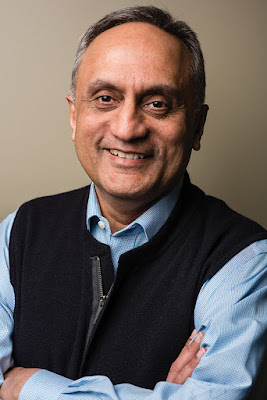
Early life
Hawking was born on 8 January 1942 in Oxford. Hawking's parents attended the University of Oxford, where Frank studied medicine and Isobel studied philosophy, politics and economics. Isobel worked as the secretary of a medical research institute, and Frank was a medical researcher. Hawking had two younger sisters, Philippa and Mary.
—Stephen Hawking
“I will always be proud that I played an important role in knowing the universe, made many new discoveries in the field of science and people appreciate my contribution. "
“I have lost control of almost all muscles and now I can only communicate through my cheek muscles by connecting the sensors on my glasses to the computer. "
—Stephen Hawking
Hawking started his schooling from Byron House School in Highgate, London. Eight-year-old Hawking attended St. Albans High School for Girls for a few months. He built a computer from clock parts, an old telephone switchboard, and other recycled components.Known as "Einstein" at the Hawking School, over time, he began to show considerable aptitude for scientific subjects and, inspired by Tahta, decided to study mathematics at the university.Hawking began his university education at the University College, Oxford in October 1959 at the age of 17. His physics teacher, Robert Berman, later said, "He only needed to know that something could be done, and that he could do it without seeing how other people did it." Hawking was concerned that he was seen as a lazy and difficult student. So, when Viva was asked to describe her plans, she said, "If you give me the first prize, I'll go to Cambridge. If I get the second prize, I'll be at Oxford, so I hope That." You'll give me that first." He was held in higher esteem than he believed; as Berman remarked, the examiners were "so intelligent they could sense they were talking to someone smarter than themselves". After receiving a first class BA (Hons) degree in Physics and completing a trip to Iran with a friend, he began his graduate work in October 1962 at Trinity Hall, Cambridge.Hawking's first year as a doctoral student was a difficult one. He was initially disappointed to learn that he had been appointed as observer, Dennis William Synema, one of the founders of modern cosmology, instead of the famous astronomer Fred Hoyle, and found that his training in mathematics was not sufficient. Work. in general relativity and cosmology. After suffering from motor neurone disease, Hawking fell into a depression – although his doctors advised him to continue his studies, they felt it made no sense. His disease progressed more slowly than doctors had predicted. Although Hawking was unsupported
Hawking met his future wife, Jane Wilde, at a party in 1962. The following year, Hawking was diagnosed with motor neurone disease. In October 1964, aware of the potential challenges caused by Hawking's short life expectancy and physical limitations, the couple engaged to be married. Hawking later said that the engagement gave him "something to live for". The two were married on 14 July 1965 in their shared hometown of St. Albans.The couple lived in Cambridge, within walking distance of Hawking's Department of Applied Mathematics and Theoretical Physics (DAMTP). During the first years of their marriage, Jane lived in London during the week as she completed her degree at Westfield College. He traveled to the United States several times for conferences and physics-related trips. Jane began a PhD program in Medieval Spanish Poetry (completed in 1981) through Westfield College. The couple had three children: Robert, born May 1967, Lucy, born November 1970, and Timothy, born April 1979. Hawking rarely discussed his illness and physical challenges, even - in an example set during his courtship - with Jane. His disability meant that the responsibilities of the home and family rested on his wife's rapidly growing shoulders, giving him more time to think about physics. Upon her appointment to a year-long position at the California Institute of Technology in Pasadena, California in 1974, Jane proposed that an undergraduate or post-doctoral student stay with her and help care for her. Hawking accepted, and Bernard Carr traveled with him as the first of many students to fulfill the role. The family spent a generally happy and stimulating year in Pasadena. Hawking returned to Cambridge in 1975 for a new home and a new job as a reader. Don Page, with whom Hawking had started a close friendship at Caltech, came to work as a live-in graduate student assistant. With the help of Page and a secretary, Jane's responsibilities are eased so that she can return to her doctoral thesis and her renewed interest in singing. Around December 1977, Jane met organist Jonathan Heller Jones while singing in a church choir. Hellier Jones became close to the Hawking family, and by the mid-1980s, he and Jane had developed romantic feelings for each other. According to Jane, her husband was accepting the situation, saying that "as long as I continued to love him, he wouldn't mind". Jane and Helier Jones were determined not to break the family, and their relationship remained platonic for a long time. Hawking's marriage had been strained for several years until the 1980s. Jane felt overwhelmed by the infiltration of essential nurses and assistants into her family life. The impact of their celebrity was daunting for co-workers and family members, while the prospect of living up to a cosmopolitan fairytale image was daunting for the couple. Hawking's views on religion also contradicted his strong Christian faith and resulted in tensions. After a tracheotomy in 1985, Hawking required a full-time nurse and nursing care was divided into 3 shifts daily. In the late 1980s, Hawking became close to one of his nurses, Elaine Mason, to the dismay of some of his colleagues, caregivers, and family members, who were troubled by his personality and strength of security. In February 1990, Hawking told Jane that he was leaving her for Mason, leaving the family home. Following his divorce from Jane in 1995, Hawking married Mason in September, declaring, "It's wonderful — I've married the woman I love." In 1999, Jane Hawking published a memoir, Music to Move the Stars, which described her marriage to Hawking and its breakup. Its revelations caused a sensation in the media, but as was his usual practice regarding his personal life, Hawking made no public comment except to say that he had not read biographies about himself. After his second marriage, Hawking's family felt excluded and marginalized from their lives. For a period of about five years in the early 2000s, her family and employees became concerned that she was being physically abused. A police investigation ensued, but was closed due to Hawking's refusal to file a complaint. In 2006, Hawking and Mason quietly divorced, and Hawking resumed a close relationship with Jane, their children, and their grandchildren. Reflecting this happy period, a revised version of Jane's book, titled Traveling to Infinity: My Life with Stephen, was published in 2007, and in 2014, The Theory of Everything, was made into a film.
According to a family spokesman, Hawking died on the morning of March 14, 2018 at his home in Cambridge. His family had issued a statement expressing his grief.















